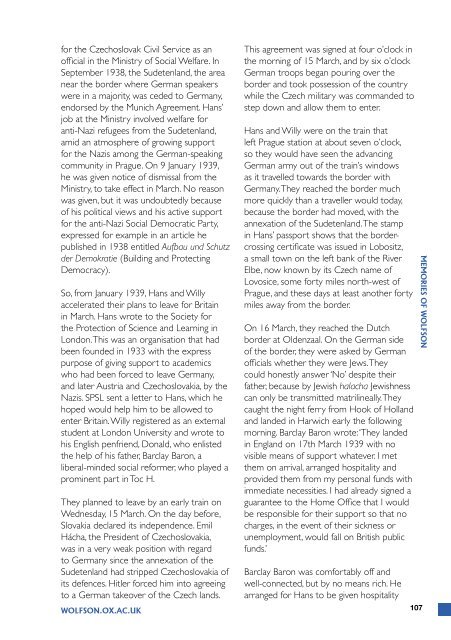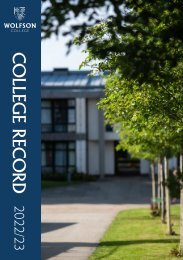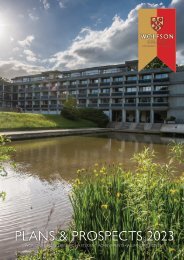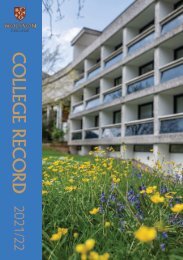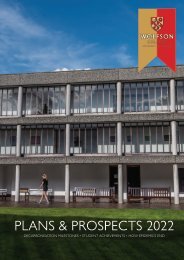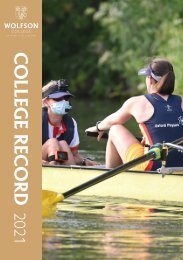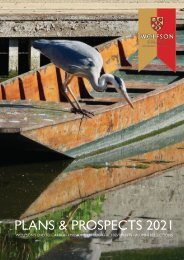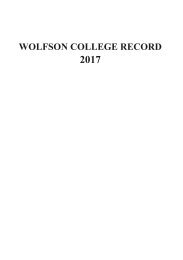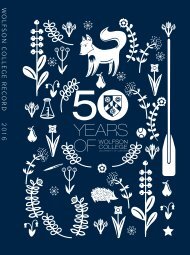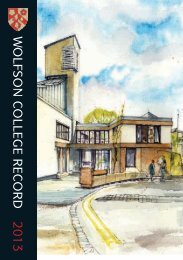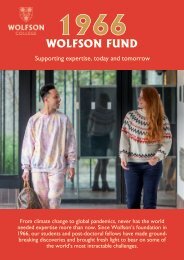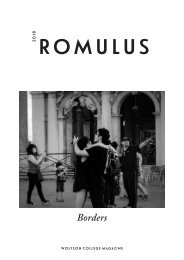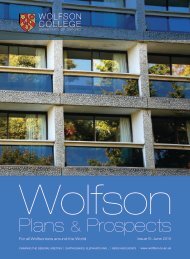You also want an ePaper? Increase the reach of your titles
YUMPU automatically turns print PDFs into web optimized ePapers that Google loves.
for the Czechoslovak Civil Service as an<br />
official in the Ministry of Social Welfare. In<br />
September 1938, the Sudetenland, the area<br />
near the border where German speakers<br />
were in a majority, was ceded to Germany,<br />
endorsed by the Munich Agreement. Hans’<br />
job at the Ministry involved welfare for<br />
anti-Nazi refugees from the Sudetenland,<br />
amid an atmosphere of growing support<br />
for the Nazis among the German-speaking<br />
community in Prague. On 9 January 1939,<br />
he was given notice of dismissal from the<br />
Ministry, to take effect in March. No reason<br />
was given, but it was undoubtedly because<br />
of his political views and his active support<br />
for the anti-Nazi Social Democratic Party,<br />
expressed for example in an article he<br />
published in 1938 entitled Aufbau und Schutz<br />
der Demokratie (Building and Protecting<br />
Democracy).<br />
So, from January 1939, Hans and Willy<br />
accelerated their plans to leave for Britain<br />
in March. Hans wrote to the Society for<br />
the Protection of Science and Learning in<br />
London. This was an organisation that had<br />
been founded in 1933 with the express<br />
purpose of giving support to academics<br />
who had been forced to leave Germany,<br />
and later Austria and Czechoslovakia, by the<br />
Nazis. SPSL sent a letter to Hans, which he<br />
hoped would help him to be allowed to<br />
enter Britain. Willy registered as an external<br />
student at London University and wrote to<br />
his English penfriend, Donald, who enlisted<br />
the help of his father, Barclay Baron, a<br />
liberal-minded social reformer, who played a<br />
prominent part in Toc H.<br />
They planned to leave by an early train on<br />
Wednesday, 15 March. On the day before,<br />
Slovakia declared its independence. Emil<br />
Hácha, the President of Czechoslovakia,<br />
was in a very weak position with regard<br />
to Germany since the annexation of the<br />
Sudetenland had stripped Czechoslovakia of<br />
its defences. Hitler forced him into agreeing<br />
to a German takeover of the Czech lands.<br />
WOLFSON.OX.AC.UK<br />
This agreement was signed at four o’clock in<br />
the morning of 15 March, and by six o’clock<br />
German troops began pouring over the<br />
border and took possession of the country<br />
while the Czech military was commanded to<br />
step down and allow them to enter.<br />
Hans and Willy were on the train that<br />
left Prague station at about seven o’clock,<br />
so they would have seen the advancing<br />
German army out of the train’s windows<br />
as it travelled towards the border with<br />
Germany. They reached the border much<br />
more quickly than a traveller would today,<br />
because the border had moved, with the<br />
annexation of the Sudetenland. The stamp<br />
in Hans’ passport shows that the bordercrossing<br />
certificate was issued in Lobositz,<br />
a small town on the left bank of the River<br />
Elbe, now known by its Czech name of<br />
Lovosice, some forty miles north-west of<br />
Prague, and these days at least another forty<br />
miles away from the border.<br />
On 16 March, they reached the Dutch<br />
border at Oldenzaal. On the German side<br />
of the border, they were asked by German<br />
officials whether they were Jews. They<br />
could honestly answer ‘No’ despite their<br />
father, because by Jewish halacha Jewishness<br />
can only be transmitted matrilineally. They<br />
caught the night ferry from Hook of Holland<br />
and landed in Harwich early the following<br />
morning. Barclay Baron wrote: ‘They landed<br />
in England on 17th March 1939 with no<br />
visible means of support whatever. I met<br />
them on arrival, arranged hospitality and<br />
provided them from my personal funds with<br />
immediate necessities. I had already signed a<br />
guarantee to the Home Office that I would<br />
be responsible for their support so that no<br />
charges, in the event of their sickness or<br />
unemployment, would fall on British public<br />
funds.’<br />
Barclay Baron was comfortably off and<br />
well-connected, but by no means rich. He<br />
arranged for Hans to be given hospitality<br />
MEMORIES OF WOLFSON<br />
107


